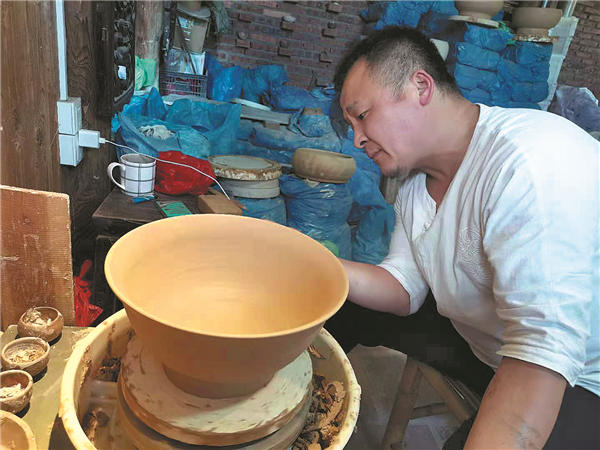

Onward together
Zhao and Xin were classmates in junior middle school. They fell in love and have been together for about 30 years.
Zhao, born in 1977 to a family with a ceramic business in Zibo, remembers that she used to help her parents in their ceramic stores with her elder brother. She took over the family business at the age of 18.
Zhao recalls that, in the 1990s, ceramics were mass-produced and one batch could contain tens of thousands of tea sets.
That trend has changed, she says, noting that people no longer require their ceramics to be functional.
"Customers, especially younger ones, have high requirements for porcelain, and many people insist that the design has to be both attractive and interesting," Zhao says.
In 2013, Zhao and Xin established Zhaoxia Ceramics, to make cultural and creative ceramic products designed by themselves.
Zhao recalls that the past decade, experiencing the ups and downs of entrepreneurship, has been hard, yet worth it.
"The development of the ceramic business over recent decades is like a miniature version of society in China," Zhao says. "It's now an era that is led by the customers."
They also collaborate with young designers to create new products. "With our 30 years of experience, we can help them to make their designs a reality," Zhao says.
As well as the series of products that are all handmade by Xin, Zhao says that their studio also launches two sets of cultural and creative products each year. This year, they are designing presents to celebrate four key moments in life, including marriage and enrollment into a prestigious school.
Xin pays great attention to the inheritance and promotion of the special techniques required to make Zibo-style color glaze. He also actively participates in various cultural activities and exhibitions and guides apprentices in his own studio.
On many visits to Jingdezhen in Jiangxi province, China's porcelain capital, Xin met with local craftsmen. Xin thinks that, as inheritors, they should combine traditional craftsmanship with digital technology to better pass down their skills.
Under the title of "Master Xin's studio", Xin livestreams on short-video platform Douyin every afternoon between 2 pm and 4 pm. He is surprised that there are thousands of people watching him making porcelain, and he enjoys answering their questions. Some fans even visit his studio to learn from him in person after watching his videos.
The couple also invites scholars, design teams and professionals from across the country to their studio to discuss how to further popularize glaze culture.
Xin and Zhao have also established a handicraft culture research institute in Zibo to gather together the city's craftsmen. "We want to be their agent, helping produce and sell their craft works, which is a way of helping to pass on these skills," Zhao says.